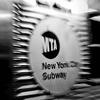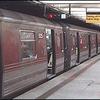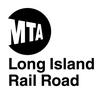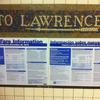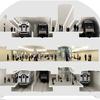Jim O'Grady appears in the following:
Snow Delay: Planned F, G Train Disruptions Postponed
Wednesday, January 05, 2011

Construction on the F and G subway lines in Windsor Terrace, Red Hook and Park Slope has been postponed in anticipation of snowfall this weekend, a transit official said.
MTA to F and G Train Riders: Fugettaboutit!
Tuesday, January 04, 2011

F and G train riders can say Farewell and Goodbye to regular service for the next two years.
Shhh - I'm Commuting Ovah Here
Tuesday, January 04, 2011
(Jim O'Grady, WNYC)
No cell, no song
low talk
in peace we travel
arrive calm
New Jersey Transit train riders first came across this Zen-tastic bit of doggerel in September. It was printed on pale blue placards posted on coaches that the agency had dubbed Quiet Commute cars.
Where before it was up to riders to silence a loudmouth on the 7:03 from Morristown--techniques ranged from icy stares to garment-rending confrontations--it was now the policy of a pilot program that cell phones and MP3 players must snooze in certain train cars, that passengers might be able to do the same. Riders cocooned in silence could presumably also read a book while gazing out now and then at a lace-winged egret fishing the shallows in front of an oil refinery. (We're talking Jersey, after all.)
As of yesterday, New Jersey Transit has not only made the Quiet Commute car program permanent--but extended its reach.
Placard found on NJ Transit Peace Trains.
The agency has added quiet cars to all peak period, peak direction trains that begin or end their trips at New York Penn Station or Newark Penn Station. Quiet cars--one at each end--will also be offered on trains that arrive in Newark or New York between 6 a.m. and 10 a.m., and trains that depart Newark or New York between 4 p.m. and 8 p.m.
Website and electronic customer surveys have revealed enthusiasm for sonic liberation from "cell phones, pagers, games, computers and other electronic devices." Riders on quiet cars are also required to keep the headphone volume low and speak in a "subdued voice" that can't be heard by other passengers. Should a boor insist on verbalizing the logistics of his life, conductors press a business card in his hand with a "gentle" reminder to shut his pie hole. But nicely worded.
The agency says it will keep polling riders about the program, which now covers the busiest train lines, with an eye toward further expansion to trains that begin or end their trips at Hoboken Terminal.
To close, here's a bit of hushed history from a New Jersey Transit press release giving credit where it's due--to another train line:
"The Quiet car concept was born in late 1999 when a small group of regular Amtrak commuters asked their conductor if one car of their early morning Philadelphia-Washington train could be designated as 'cell phone-free.' The conductor agreed and Amtrak quickly expanded the concept. Within months, most weekday Amtrak trains on the Northeast Corridor featured Quiet Cars."
Silence Is Golden: New Jersey Transit Quiet Cars Now a Fixture
Tuesday, January 04, 2011

MTA Touts Gate-Less Tolls on WNYC
Tuesday, January 04, 2011

The NYC Metropolitan Transportation Authority is spending $13,000 to support WNYC programming.
MTA Railroad Fees Can Be More Costly Than A Ticket
Tuesday, January 04, 2011

A raft of new fees on Metro North and the Long Island Rail Road can be even more costly to riders than the recent 8.8 percent rise in prices.
Claim: MTA's Technical, Supervisory Failures Led to 600 Snowbound Buses
Thursday, December 30, 2010
Stranded bus driver wants some help.
(New York -- Jim O'Grady, WNYC) The MTA says it's investigating why 600 buses had to be abandoned during this week's blizzard, blocking snowplows and leaving bus drivers and their passengers without a way home. A combination of technical and supervisory failures appear to have led to the debacle.
A union official who drove a bus for 15 years, and who spoke on background, says the problems began because the MTA generally equips its buses with tires built for long life but little traction. The official says the authority then decided against putting chains on many buses to save on overtime costs because it takes two workers 30 minutes to fit each bus.
He further charges
Claim: MTA's Technical, Supervisory Failures Led to 600 Snowbound Buses
Thursday, December 30, 2010

The MTA says it's investigating why 600 buses had to be abandoned during this week's blizzard, blocking snowplows and leaving bus drivers and their passengers without a way home. A combination of technical and supervisory failures appear to have led to the debacle.
Your Guide to the Transit Fare Hikes
Monday, December 27, 2010

A fare increase will make almost every form of transit in the New York area more expensive on starting on Thursday. Subway and bus fares are going up, along with tolls on seven bridges and two tunnels. Prices will also rise on Long Island Rail Road and Metro-North trains.
MTA Squabbling + Poor Management = Years of Delays and Nearly $2 Billion Over Budget on Mega-Projects
Thursday, December 23, 2010

MTA Inspector General Barry Kluger is looking at why three of the agency's four big projects are behind schedule and over budget by nearly $2 billion. He said in a new report that squabbling at the agency is a big part of the problem.
MTA Squabbling + Poor Management = Years of Delays and Nearly $2 Billion Over Budget on Mega-Projects
Wednesday, December 22, 2010
 (New York -- Jim O'Grady, WNYC) The Inspector General of the New York area Metropolitan Transportation Authority slammed the agency in a report for ignoring procedures it had set up to keep mega-projects on budget and on schedule.
(New York -- Jim O'Grady, WNYC) The Inspector General of the New York area Metropolitan Transportation Authority slammed the agency in a report for ignoring procedures it had set up to keep mega-projects on budget and on schedule.
Predictably, says Inspector Barry Kluger, three of those projects are now nearly $2 billion over-budget combined and delayed by two to five years. That means subway riders and others must slog through construction zones all the longer while waiting for expanded service that is repeatedly postponed as taxpayers rack up greater and greater debt.
These “mega-projects have experienced well-publicized budget overruns and disruptive schedule delays that have seriously undermined public confidence in the MTA’s management,” the report said.
Two of the projects are already five years behind schedule: an extension of Long Island Railroad to Grand Central Terminal, now expected to be done by April 2018, and the first leg of the Second Ave. subway, now scheduled for completion in 2017. The Fulton Transit Center, with its projected finish in 2014, looks good by comparison. It’s only two and a half years late.
Only the 7 Train Extension, the last of the MTA’s four megaprojects, does not suffer from significant lateness or cost over-runs. The four projects have budgets totaling $15.32 billion.
Kluger says MTA Capital Construction, a subsidiary charged with overseeing the agency’s capital spending, clashed with an “independent engineering firm”—it did not name the firm—over who was in charge of monitoring the projects. His report says the engineering firm was at times given too much to do with too little information. And the firm wrote bad reports that lacked clear summaries or were too technically detailed to be easily understood. Sometimes, when the firm did make a plain recommendation, MTA Capital Construction ignored it.
At Kluger’s insistence, the MTA has separated the squabbling entities. The agency’s Office of Construction Oversight will now manage the independent engineer. The Office's mandate is to bring about “less conflict and more effectiveness to the oversight process.”
Kluger said another problem was megaprojects bidding against each other for a limited number of highly specialized contractors, which drove up prices. He warned that this might soon happen again as each project goes shopping for contractors to install signal and communications systems.
The Inspector General said MTA Chairman Jay Walder has accepted the report’s findings and used them to tell the Office of Construction Oversight to get a firmer grip on spending and scheduling.
![]() Follow Transportation Nation on Twitter for more stories.
Follow Transportation Nation on Twitter for more stories.
Mixed Signals for City Pedestrians
Monday, December 20, 2010
New Yorkers are famous for crossing streets whenever they feel like it, taking a blasé attitude toward crosswalk signals. But the signs tend to capture the attention of pedestrians when the "walk" and "don't walk" icons are lit up at the same time, which is the case at intersections all over the city.
The $128 Million Question: Where's the ARC Tunnel Letter?
Friday, December 17, 2010
(New York - Jim O'Grady, WNYC) New Jersey Governor Chris Christie stood up at a press conference on Thursday morning at the state house in Trenton and uttered what could have been a $128 million phrase.
“The offer was a nice start,” he said.
He was referring to a letter from federal Transportation Secretary Ray LaHood that offered a rebate in the above amount against a $271 million charge the feds have presented the state for preliminary work on the cancelled ARC rail tunnel under the Hudson.
Christie killed the project in October because of projected cost overruns. LaHood, in the letter, proposed to give the state $128 million back for projects that improve air quality by cutting traffic congestion. But only if New Jersey pays the whole bill by December 24.
The governor’s positive reaction on Thursday was a reversal of sorts. The prior two days, he’d refused to acknowledge the potential deal because the letter that contained it, dated Tuesday, hadn’t been sent to him. Instead, it was addressed to New Jersey Senators Robert Menendez and Frank Lautenberg. By Wednesday evening, though the offer had been widely reported, Governor Christie’s spokesman Michael Drewniak insisted it still hadn’t reached the state house.
“Neither the Governor’s Office or New Jersey Transit has heard from Secretary LaHood,” said Drewniak in a statement. “If and when we are contacted by the secretary, we will review their proposal.”
The disconnect may have had something to do with testy public relations between the Republican Christie and the Democrat Lautenberg.
The $128 Million Question: Where's the ARC Tunnel Letter?
Friday, December 17, 2010

The prospect of a $128 million rebate for New Jersey may be all that’s needed to calm the collision of personalities and political agendas at the center of the ARC Tunnel debate.
NJ Governor Christie Mum About Feds' Offer to Cut $271 Million ARC Bill Nearly in Half
Thursday, December 16, 2010

New Jersey could be off the hook for almost half the $271 million the federal government says the state owes for scrapping a rail tunnel under the Hudson.
NJ Governor Mum About Feds' Offer to Cut $271 Million ARC Bill Nearly in Half
Wednesday, December 15, 2010
(New York -- Jim O'Grady, WNYC) New Jersey could be off the hook for almost half the $271 million the federal government says it owes for scrapping a rail tunnel under the Hudson after work had been started.
Jim O'Grady, WNYC) New Jersey could be off the hook for almost half the $271 million the federal government says it owes for scrapping a rail tunnel under the Hudson after work had been started.
The U.S. Department of Transportation says it will give the state $128 million back for projects that improve air quality by cutting traffic congestion. But only if New Jersey pays the whole bill by December 24.
Transportation Secretary Ray LaHood released a letter containing the offer. A spokesman for Governor Christie said he had no comment on it because the department hasn't contacted him.
Governor Christie halted the $8.7 billion ARC tunnel project in October because of potential cost overruns. The decision has been controversial. New Jersey Senator Frank Lautenberg, for one, repeatedly decries it as “disastrous.”
Lautenberg took credit on Wednesday, along with fellow New Jersey Senator Robert Menendez, for brokering the rebate offer from Transportation Secretary Ray LaHood. A press release from Lautenberg claimed that, “The Senator has been working quietly with DOT on reducing New Jersey’s burden since the project was killed.”
Now the Christie administration must decide if half a loaf is enough to end its scrap with the feds. Earlier this month, the governor directed New Jersey Transit—the state agency overseeing the project—to hire well-connected DC law firm Patton Boggs at $485 an hour to fight the tab from LaHood, which is for preliminary work on the ARC tunnel.
James Weinstein, executive director of New Jersey Transit, stood before reporters after a recent board meeting at the agency and contended the federal government was wrong to ask for money it spent in collaboration with the state.
“This isn’t like they sent us a check for $270 million and then walked away and let us spend it,” Weinstein said of the U.S. DOT. “They were a participant in everything we did, every day, every minute, every hour.“
If the Christie administration sticks to that position, it could be that the Transportation Secretary just made an offer that can be refused.
U.S. Senate Voting on $230 Monthly Commuter Tax Benefit
Tuesday, December 14, 2010
(New York--Jim O'Grady, WNYC) The U.S. Senate is voting today on a tax cut compromise that includes a provision allowing transit riders to deduct up to $230 per month for the cost of their commute.
The move would be a big step toward extending a benefit that began last year as part of the Obama administration's federal stimulus package. Before then, a transit commuter's monthly pre-tax benefit was capped at $120. Raising the cap to $230 put bus and train riders--and van poolers--on par with those who drive to work and pay for parking.
Tri-State Transportation Campaign, an advocacy group that works in Connecticut, New Jersey and New York, has been pushing the provision. Spokeswoman Ya-Ting Liu said, "At the end of the day, given the growing need for affordable transportation options, and the growing economic cost of traffic congestion, fed policy should reward transit use. And that’s exactly what this does."
After the Senate vote, the tax package compromise will be taken up by the House. Should it pass there, the House and Senate would need to come up with a reconciled bill and then pass that bill before the end of the year.
Liu said the yearly suspense over the $230 benefit for transit riders could be avoided if the provision were to be written into the tax code, as it has been for drivers.
"The underlying issue is parity between transit and parking," she said. "Right now, this is a permanent benefit that only drivers enjoy."
For more on the issue and its economic ramifications, see this Marketplace report.
NJ Transit Hires K Street Powerhouse to Fight $271 Million Tab for ARC Tunnel
Thursday, December 09, 2010
Law firm Patton Boggs is a major K Street lobbyist in Washington, DC.
(New York -- Jim O'Grady, WNYC) New Jersey Transit is ratifying Governor Christie's decision to hire DC law firm Patton Boggs to fight a $271 million tab from the federal government for work on a defunct tunnel project.
Patton Boggs is one of Washington's most influential--and best paid--lobbying firms. New Jersey Transit executive director James Weinstein says the firm's expertise in the ways of federal bureaucracies make them worth the $485 an hour they'll be charging the state.
"Whatever we pay this law firm is going to be far less than what the federal government and the Federal Transit Administration is asking us to pay them," Weinstein said.
The FTA is giving the state until December 24 to pay its "debt to the United States"--reimbursement for initial work on the ARC tunnel project. Governor Christie cancelled it in October, citing the possibility of cost overruns. The move has proved popular with 56% of polled voters in New Jersey.
MTA Chief Talks Tough About Unions
Thursday, December 09, 2010
 (New York -- Jim O'Grady, WNYC) MTA Chairman Jay Walder says unions have to agree to freeze their wages--or straphangers will have to pay more.
(New York -- Jim O'Grady, WNYC) MTA Chairman Jay Walder says unions have to agree to freeze their wages--or straphangers will have to pay more.
The MTA is hiking fares later this month--and is also planning another 7.5% increase in 2013. But Walder warns that fare hike will be even larger if unions don't help out.
He told a State Assembly committee that labor hasn't "played an active part" in helping the MTA face its budget crisis. Walder says he'll only agree to cost of living raises if the unions match them with increased productivity or fewer benefits.
Of the agency’s more than thirty unions, all but three are negotiating a new contract or will begin to do so in the next year.
Transport Workers Union spokesman Jim Gannon described Walder's style as "take it or leave it" and didn't think it would succeed. "That's not the way we do business," he said.
First Fare Hikes, Now NJ Transit Users Will Pay More to Park
Monday, December 06, 2010
Over there, an empty spot. Image by Flickr user JGNY
(New York -- Jim O'Grady, WNYC) New Jersey Transit is preparing to charge more money for parking spots. The cash-strapped agency says its plan to privatize eighty-one parking lots at train stations and bus stops will raise an estimated $100 million dollars.
The agency has narrowed the field of competing companies to seven. The winning firm will be chosen in May and offered a 30 to 50 year lease. It will then control 60% of the parking spots in New Jersey Transit's system.
Prices are expected to rise at lots that already charge drivers to park and fourteen free lots covered by the plan are likely to begin collecting fees. The increases come on top of a 25% fare hike in May for New Jersey Transit train and interstate bus commuters.
Critics say the agency is sacrificing steady income for a large up-front payment. Jay Corbalis, an analyst with the public policy group New Jersey Future, said the plan is mainly designed to deliver a spike of revenue toward next year's budget.
"But that compromises future revenue for the agency," he said.
He added that privatization will lock up some parcels next to train and bus stops that might better be developed with office buildings and stores. "It raises a number of questions about the long-term use of the lots," he said. "This land would not be available for 30 to 50 years for transit-oriented development."
NJ Transit says a private operator will upgrade the lots and bring consistency to a system that is operated by a combination of municipal, private and New Jersey Transit operators.
